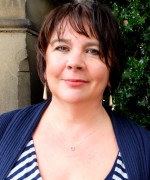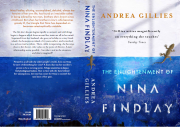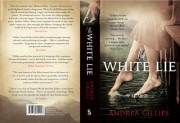The Three Golden Rules of Novel Writing
Andrea Gillies is the author of three books: the novel The Enlightenment of Nina Findlay (2014), the novel TheWhite Lie (2012), and the non-fiction book Keeper, which won the Wellcome Book Prize 2009 and the Orwell Book Prize 2010. We asked her for some novel writing advice.
 Knowing the terror of the blank white page, and all the blank pages lying behind it, I don’t usually start at the beginning. I make myself write down and hone what the story is about on one sheet – more plot unspools as it’s re-written.
Knowing the terror of the blank white page, and all the blank pages lying behind it, I don’t usually start at the beginning. I make myself write down and hone what the story is about on one sheet – more plot unspools as it’s re-written.
Next, I make a list of characters who’ve come to mind in imagining the story; I might identify their faces using actors’ images online. Then I start to write scenes, or the notes for scenes I might use. The word might is crucial. It’s vital to realise that at this stage, you’re free associating, and will come up with a lot of stuff you discard later. Let yourself imagine. Editing is easier than adding: I cut 15,000 words from Nina Findlay just before she was sent out.
Golden Rule number 1: Never show the work in progress to anyone until it’s done. At that point, one or two other opinions are useful. My books always go to another draft after my agent has read them, and then to a final one just before publication: the last polish is always swift and sure, after a break from being in the story. Your subconscious keeps working on things. Give it time to do its job.
So here I am, with a few characters, a few scenes and other oddments, the often random points at which the book has surfaced. More scenes are devised and now I have a storyline: things happen in a particular order (the order’s important: all fiction needs tension). Only now do I try to start at the beginning, and to write the book that stitches the scenes together. I never read back.
Golden Rule number 2: don’t read back until you get to the end of the draft.
Far too many people give up because their first attempt hasn’t gone well. They’re stuck; it’s no good; they don’t have confidence in what they’ve written. But that’s normal. The first draft is almost always terrible; this I have learned.
What’s important is to get it down in words – in any words, so that you have a story, and things happen, and people talk to one another. (If they’re slow to talk, put them in a room together and listen to what they say. I wrote a lot of The White Lie that way).
 While you are allowing yourself to be free in what you write, your subconscious will start on the project, and things will begin to evolve. You’ll also find that some of what you allow yourself to say when it’s not ‘the official version’ will be writing that you don’t ever edit out.
While you are allowing yourself to be free in what you write, your subconscious will start on the project, and things will begin to evolve. You’ll also find that some of what you allow yourself to say when it’s not ‘the official version’ will be writing that you don’t ever edit out.
Sometimes we’re too tight and too anxious about quality to allow ourselves to be creative. I am firm with myself, these days, about the first draft not being the official version. I can say anything, and do, and go off on wild tangents that are trimmed back in the second draft. That’s all good. That sets the imagination free.
Golden Rule number 3: The second draft is the place you want to get to, as fast as possible.
This is where the writing starts. You need flow, now: observe Golden Rule #2. Once the first draft is done, from A through to Z (though of course the ending may change radically in the rewrite), and you’ve included all the characters, conversations and scenarios you can currently think of that might be important to the story, you’re ready for the printout, and big pots of tea and a red pen.
Though most of what you read may be awful, chances are you’ll like some of it, even if it’s just one scene, the development of one character, or a conversation that strikes you as true. It’s all progress. Lots of crossing out and inserting goes on at this point, and I go back to the laptop to write sections that link the bits I want to keep, until I have a big jigsaw puzzle and am ready to print out again.
 This is draft 1b. You’re not even onto the second draft yet, and you may have used a lot of paper – I used 6 packets in total, or 3000 sheets, when writing The Enlightenment of Nina Findlay. But that’s my technique; I write fast, and edit on paper, and don’t judge myself, because I have learned that it’s all part of the process.
This is draft 1b. You’re not even onto the second draft yet, and you may have used a lot of paper – I used 6 packets in total, or 3000 sheets, when writing The Enlightenment of Nina Findlay. But that’s my technique; I write fast, and edit on paper, and don’t judge myself, because I have learned that it’s all part of the process.
Things get better slowly, until, (often between drafts two and three), there’s a sudden leap forward that’s reassuring. Sometimes, even then, I remain unimpressed with my approach. This is the dog-walking and thinking time. Perhaps the book needs to be written the other way round and start at the end? (I did this with The White Lie).
Perhaps it needs to be written in someone else’s voice, from a different character’s perspective? (I did this with Nina, who was originally first person). If you feel you need to start completely afresh, don’t worry; that happens. Writing’s mostly about stamina. I went to a dozen drafts with Nina Findlay, the last of them written in a month, a chapter a day, to synthesise the narrative better. If you’re writing your first novel, good luck! Remember, it’s never too late. My first novel was published when I was 51. Mary Wesley started at 70.
© Andrea Gillies, 2014
The Enlightenment of Nina Findlay is published by Short Books on 3 April 2014.
Find out more about Andrea and her books on her website www.andreagillies.com, or follow her on twitter, facebook and pinterest.
Category: Contemporary Women Writers, How To and Tips
Comments (9)
Trackback URL | Comments RSS Feed
Sites That Link to this Post
- The Three Golden Rules of Novel Writing | Litte... | March 7, 2014































In this article, you have shared some really very good tips on writing novels. With the help of these tips, I think that I will also be able to write a good novel. I really had a great time reading this article. Thank you for taking all the efforts to write this article and sharing it with us.
I break Rule 1 all the time, but I’ve realised that parts of that is because my 1st draft is closer to what’s described as a 2nd draft. My 1st draft mainly takes place in my head, so I have a coherent (if mutable and generally sparse) storyline with no ginormous plotholes when I’ve finished the first write-through
Thank you for the advice, Andrea. I’ll have to keep the three golden rules of novel writing in mind.
I have to say I disagree with #2. I tried it at one point because it made sense, and it completely wrecked my story. I’m an organic writer, and doing that left out an important part of my creative process that was essential for creating the story. I have to constantly move around in the story and reshape it as I learn more about what the story is.
Rule #3 is a challenge for me. My goal is to get there with my current WIP by 5/29/14. I want to get to the 2nd draft where I’m promised a pot of tea as I edit!
I think your second point is spot-on.
We mentor a lot of first time novel writers and the desire to go back and “fix” what they had is overwhelming. It’s so easy to think yourself out of writing and overanalyse what you’re doing. I was speaking to someone this week who is writing the middle of her book and she was worried about having the right voice for her writers and whether it was flowing well, even though she was confident about it the week before.
As you say it’s hard to disconnect the subconscious and just write.
Wonderful advice. I love your characterization of the editing process. A lot of writing advice seems to center on the the Shitty First Draft, which I applaud. Your insistence on refraining from judgement (or even re-reading) spot-on. But so often I find that the time spent and effort required for editing and rewriting often seem to be given little attention, so I was pleased to see the supply list for editing (much paper and more tea). 🙂
Reassuring to hear editing processes esp when they emphasise the creative alongside the technical.
I always take a deep breath and dive in after my first draft whether it is two weeks, two days or two years after the initial creative outpouring. Its hard!